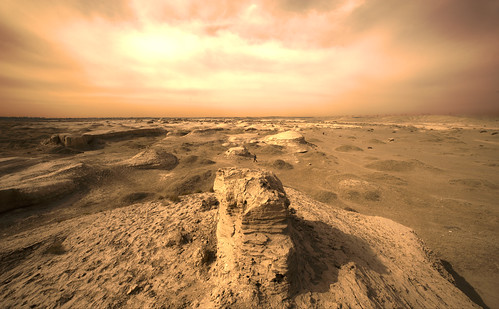Not Yet Forgotten
Red sand blew over the wasteland. It gummed up my rebreather, and coated my faceplate. My one-suit, once shiny white, had faded to dingy taupe under the ceaseless coatings of dust. I stumbled along, already exhausted after three hours on the morning shift of the dig, discouraged because I’d found nothing.
Then I tripped over it: A rock, barely above level, with a distinct right angle. An Arnellian artifact.
Most of the ruins on Arnellios V were buried under the dust. Millions of years of dust, solidified into sand, into mud, and finally into solid rock. My job was to unearth the buried secrets, to unlock the technology that had vanished with the Arnellians themselves half a million years ago.
I called in the excavators. The robots used laser to patiently and delicately dislodge the artifact from the surrounding rock. I took a water break at the base camp tent. I monitored progress on my faceplate, but I knew an artifact of this size—it would probably be 2.3 kilometers square, like others we’d found—would take half a day for the robots to excavate. The little bit I’d tripped over was literally just the tip of the artifact.
I should have felt elated at the find, but instead, I sank deeper into my malaise. It’s depressing to tramp through the ruins of a dead civilization day after day. The hope is that their technology will one day be of use to humans, but since we have no way to crack their language, the chances of that are slim. Our computer translators are excellent, but the fact is, without a basis for comparison—a known language, or a live speaker—it’s pretty much impossible to crack a dead script.
Bruno G. found me. I was lost in my own gloomy thoughts and didn’t notice him before he clapped me on the back with a huge whoop.
“Do you know what you’ve done?” he cried gleefully.
“Huh? What? Oh, the rock. Yeah, another one.”
“It has writing!”
“Most do.”
“Look at your screen!” he ordered. He could barely contain his grin.
I peeked again, but still didn’t see anything special. The Arnellians used a distinct blocky script, and the stone was covered with it. There was also a curly script beneath it….
I felt my stomach drop.
“Oh my god,” I whispered, “Is that Gyrlish?”
“It sure is!” Bruno whooped again. “We’ve found it! We’ve found our Rosetta Stone! The translation computers are chugging away now, comparing the two alphabets. We’ll have a full translation program for Arnellian by the end of the day!”
“I can’t believe it.”
My depression evaporated. I whooped along with Bruno. The rest of the team heard the news and gathered at the base camp tent. We took out the good stuff, that we’d be saving for the end of the dig, and poured it out until we were all tipsy. We sang old camp songs and told dirty jokes.
The first translations started coming in from the computers by the end of the evening shift, just as Bruno had predicted. He handed me a print out on a plastisheet. We didn’t normally print, but it was tradition for the first formal translation of a new alien language.
“The honor belongs to you,” Bruno said. “It’s the translation of the stone you found. What does it say?”
The whole crew of thirty-one archeologists fell silent as I looked down at the plastisheet. It was already slightly pinkish from dust.
“It says…” I began.
My throat choked up. Not just because of the importance of the moment, but because of the words.
“It says: In eternal memorial of those who gave their lives for us. You are not yet forgotten.”

Comments